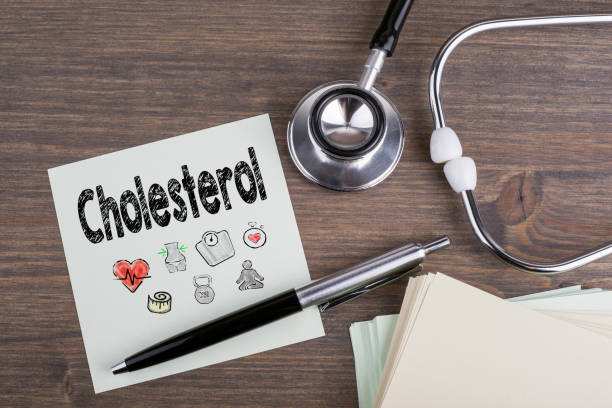What exactly is cholesterol?
Your cholesterol is a waxy fat-like substance produced by your liver that is also derived from the foods you eat and packaged into particles known as lipoproteins. Your body requires cholesterol to produce hormones, Vitamin D, and bile, a substance that aids digestion.
The bloodstream transports the cholesterol throughout your body. Cholesterol is a key substance that is used by your body to support its functions. The exact quantities required on a daily basis depend on how the body processes the food you eat.
A cholesterol test, which is a blood test, is used to determine cholesterol levels. This test determines the amount of fat in your body.
Sources of Cholesterol
The liver is the part of the body that produces all of the different types of cholesterol that our bodies require. However, cholesterol can be obtained from foods as well. Some of the food items that contain dietary cholesterol are meat, dairy products, and poultry.
Why keep an eye on cholesterol
High cholesterol causes the formation of fatty acids in your blood vessels, clogging them and resulting in low blood flow. They can form clots after breaking, resulting in a heart attack or stroke.
- A heart attack can occur if blood flow is blocked and cannot reach the heart.
- A stroke can occur if blood flow is blocked and cannot reach the brain.
- A peripheral artery disease can occur if blood flow is blocked and cannot reach the arms or legs.
In the blood, cholesterol circulates. When the body’s cholesterol level rises, so does the individual’s health risk. Cardiovascular diseases, such as heart disease and stroke, can be significantly accelerated by high cholesterol levels.
That’s why it’s critical to have your cholesterol checked by doing a periodic cholesterol test so you know what your cholesterol levels are at the present moment.
Types of cholesterol
Knowing what types of cholesterol are present in our bodies is essential for a better understanding.
Cholesterol is carried by two types of lipoproteins. Lipoproteins transport it into and out of cells. The two types of lipoproteins are LDL, which stands for Low-Density Lipoprotein, and HDL, which stands for high-density lipoprotein. The LDL is termed as bad cholesterol while the HDL is termed as good cholesterol.
- LDL – Low-Density Lipoprotein
LDL circulates in your bloodstream, carrying cholesterol to cells that need it. If you have too much LDL in your body, it can accumulate in the walls of your arteries, forming a fatty deposit known as “plaque.” Over time, plaque can narrow the artery and reduce blood flow. LDL transports cholesterol into plaque.
This is why LDL is known as “bad cholesterol.” This plaque can accumulate in your coronary arteries, which are the blood vessels that supply your heart with oxygen and nutrients.
This plaque buildup leads to coronary artery disease, which raises your risk of having a heart attack. Plaque buildup in other arteries, such as your neck’s carotid arteries, can reduce blood flow to your brain and raise your risk of stroke.
- HDL – High-Density Plaque
High-density lipoprotein (HDL), also known as good cholesterol, is also produced by the liver. HDL aids in the removal of excess cholesterol from the tissues of your cells as well as a plaque in your blood vessels. HDL returns the excess cholesterol to your liver, which removes it from your body.
Remember: you want to keep your HDL levels high. Think of HDL as the garbage man of the body, and it does the opposite of what LDL does. It pulls the cholesterol out of the fatty plaque in your blood vessels and returns it to the liver, where the liver can dump it into the bile and you can pass it through your stool.
- Triglycerides
This is the other type of cholesterol that you should know about. Triglycerides form the core of all lipoproteins, and lipoprotein is basically a complex of lipids and protein together, and you should think of triglycerides really as the building blocks or the Legos that make up the cholesterol.
These are stored in fat cells and used as energy sources for the body, and high levels are found in people who are overweight, have high cholesterol, or people who have diabetes.
- Total Cholesterol
HDL (Good Cholesterol) + LDL (Bad Cholesterol) + 20% of Triglycerides = Total Cholesterol
Cholesterol Test
This is a test that determines the level of cholesterol in your blood. It provides important information about your cholesterol level to you and your doctor, which is then used to determine your risk of developing heart disease.
If you have a high cholesterol level on a test, you can begin taking medication to lower it right away. This will reduce the likelihood of any heart-related complications. The cholesterol blood test is used to test LDL levels, HDL levels, Total cholesterol, Triglyceride levels, and VLDL levels. It is always measured in milligrams(mg) of cholesterol per deciliter (dL) of blood. Maintain a low LDL and a high HDL level for better heart health.
Final Overview
These are some of the most fundamental aspects that you must take into consideration to effectively manage your Cholesterol levels. Be sure to seek assistance from expert professionals to know more about this topic.















